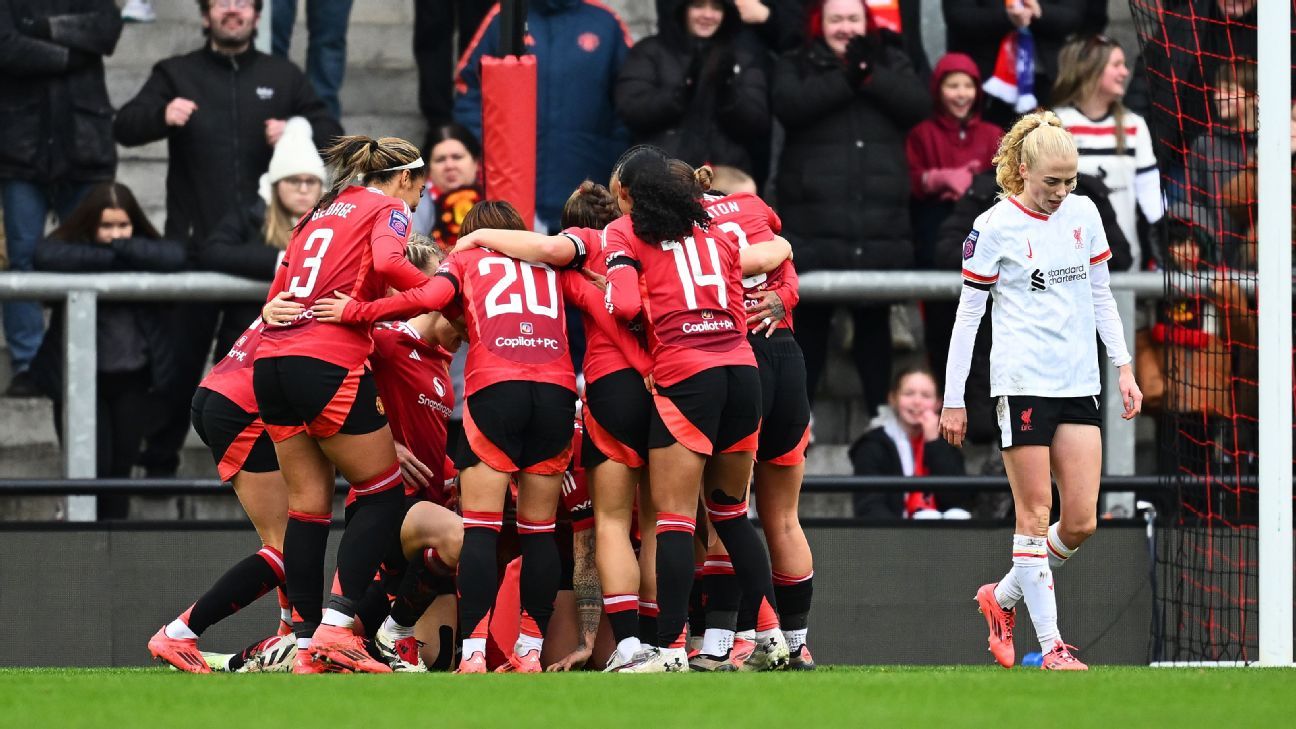Manchester United beat rivals Liverpool to push their claims for a top-three finish in WSL. Gareth Copley/Getty Images
MANCHESTER, England — As Leah Galton scored to put Manchester United 2-0 up over Liverpool in the first half of their Women’s Super League (WSL) clash, the contrast between the scenes in the two dugouts could hardly have been more stark.
United boss Marc Skinner spun on his heels and punched the air; Liverpool’s manager Matt Beard remained rooted to his seat, still shellshocked by Elisabeth Terland’s opener which had only arrived a minute earlier. It showed how fine the margins are at the top level of the women’s game, and just how quickly the fortunes of a manager and their team can change.
United and Liverpool are arguably Engand’s most formidable men’s footballing institutions, with more than a century of success on both the domestic and European stage behind them. For their women’s teams, though, earning a seat at the WSL’s top table is proving considerably more difficult.
Editor’s Picks
2 Related
United’s win on Sunday temporarily moved them up the third — though they were later usurped by Arsenal following their victory over Aston Villa — and into the Champions League places. But Skinner’s side are six points off leaders Chelsea, who also have a game in hand, and this season’s charge for the title is seemingly already a two-horse race between the London club and Manchester City.
Liverpool, meanwhile, are down in seventh, having won just two of their nine WSL games so far this term. For both teams, the battle to consolidate a place among the division’s long-established top three of Chelsea, City and Arsenal remains a work in progress.
United’s commanding victory over Liverpool at Leigh Sports Village — secured thanks to goals from Terland, Galton, Dominique Janssen and Melvine Malard — was the perfect tonic after another difficult week for the club off the pitch. On Saturday, minority owner Sir Jim Ratcliffe, who acquired a 27.7% stake in the club earlier this year, sparked controversy with his comments about the women’s team.
Speaking to club fanzine United We Stand, the INEOS chief said: “There’s only so much that you can do and our focus has been on the men’s team. If not, you get spread too thinly. We need to sort out the main issue, the men’s team. The women’s team is an opportunity. Women’s football is growing really quickly in popularity and size. We need to participate in that. The girls wear a Manchester United badge on their shirt and they’re representing the club.”
It is not the first time Ratcliffe’s perceived apathy towards United Women has caused a stir. Back in May, the 72-year-old opted to attend United’s Premier League clash with Arsenal instead of the Women’s FA Cup final at Wembley, where Skinner’s side yielded the club’s first major women’s trophy with a win over Tottenham Hotspur.
The following month, Ratcliffe drew further criticism after admitting in an interview with Bloomberg that plans for the future of the women’s team were “TBC”. While Ratcliffe’s string of PR missteps are perhaps rooted in pragmatism, his behaviour has repeatedly undermined the “one-club mentality” United have tried to foster since their women’s team was re-established in 2018.
“I think you have to assess a lot,” Skinner said after Sunday’s game, when asked whether it is difficult to constantly have to field questions about matters off the pitch. “I think you have to take a lot as a human.
“I think the role of a football manager has changed and it’s evolving. You see that in the men’s game. Of course we’re human, we feel, we have our emotions. But we also have a role and a job and a responsibility to my players the fans and the club. I would be lying if I said it’s easy, but also I have a job to do and I’ve got to do that to the best of my ability.”
Elisabeth Terland has been a great signing for Manchester United. Charlotte Tattersall – MUFC/Manchester United via Getty Images
The state of play at United has been further unsettled by the surprise departure of sporting director Dan Ashworth, which was confirmed by the club only hours before Skinner’s side kicked off against Liverpool on Sunday. His exit has been viewed in some quarters as a further blow to the women’s team, with the 53-year-old having only officially arrived in July after a £3 million settlement was reached with his former club Newcastle United.
Ashworth has long been an advocate for the growth of the women’s game and had forged a positive relationship with Skinner during his time at United. In an open letter to supporters in the summer, Ashworth insisted that the women’s team was a “key objective” of his job and had been a major part of his remit during his time with Newcastle, Brighton & Hove Albion and the FA.
STREAM FUTBOL W ON ESPN+
Ali Krieger and Sebastian Salazar debate the biggest storylines and break down the best highlights from women’s soccer in the Americas. Stream on ESPN+ (U.S. only)
“Dan Ashworth and Omar Berrada have been fantastic and have both come in with real energy to speak to the group,” Skinner said in a news conference earlier this season. “I cannot tell you how personable and authentic those conversations were. They genuinely love women’s football and have a real burning ambition for it to be in the forefront of their direction. That will only improve.”
Whether Ashworth’s successor is similarly passionate about empowering United Women remains to be seen. However, after the Liverpool game, Skinner was quick to emphasise the support he and his players continue to feel internally, reiterating his own determination to focus on performances on the field.
“What I know about the club is that it has a love and an affinity with our women’s team, I know that,” he said. “I sense it every day when I go into the training ground. I know the love for our team is there. I don’t know what that path looks like quite yet and I’m sure that is a part of the planning process from above to sell us that and I’m sure, over the next few weeks, we’ll talk more about it.
“But I want us as a team to focus on what we can control and that is the football part, and then away from that, I know we can be a massive part and are a massive part of this club and we’ve got to work out what that looks like.”
Matt Beard has overseen a rise at Liverpool but it’s not been enough this season. Nick Taylor/Liverpool FC/Liverpool FC via Getty Images
From a Liverpool perspective, Sunday’s defeat was yet another bracing reminder of the gulf that still exists between them and the game’s big hitters. Beard’s side defied expectations last term to secure a fourth-placed finish, ending the season six-points clear of United, whom they toppled in both of their WSL meetings.
Those victories seemed to symbolise an upwardly mobile Liverpool, capable of upsetting the league’s top order. While injuries have been a major factor in the team’s recent inconsistent form — with a number of key players, including last season’s top scorer, Sophie Román Haug, currently sidelined — they look some way off being able to compete for the game’s top honours.
“It’s frustrating,” Beard said after the game. “We know we’ve got one of the smallest squads in the division. I’ve said it before, we can only work with the resources we have budget-wise. I feel like we actually started the game quite well, but we had a moment of madness where two minutes killed the game for us.”
Beard’s reference to the financial parameters he is working within at Liverpool again raises an important point about the disparity between the WSL’s top three and the rest of the division. The club have come a long way since being relegated in 2019 — incidentally the same year that Jurgen Klopp’s side lifted the Premier League title — and have gone to great lengths to improve the professionalism of the women’s team, repurchasing Liverpool men’s former training ground, Melwood, as a base for Beard’s side and breaking the club’s transfer record in consecutive summers to bring in Roman Haug and Olivia Smith.
But with the ruthlessness and knowhow of perennial winners Chelsea leaving little room for error in the WSL, it is clear it will take time for Liverpool to assemble a similarly well-stocked squad.
“It’s not always about the money,” Beard said. “I don’t know what all the other teams spend. I know what we spend and we’ve overachieved in the last two years. If you look at the investment from the other sides – – I’m not saying we’ve stood still, I don’t think we needed many changes. We were consistent last season with team selection whereas this year I don’t think I’ve been able to pick the same team twice.”
With seven first-team players missing this weekend’s clash with United, it is perhaps little wonder Liverpool struggled against Skinner’s side. But, with the WSL growing more competitive year-on-year, it is apparent both they and their hosts have a tough road ahead if they are to consistently compete at the highest level.







